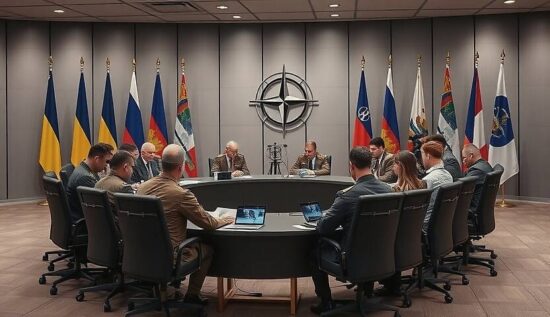US and European Leaders to Discuss Military Aid to Ukraine Until 2027
Ahead of the 25th meeting of the Ukraine Defense Contact Group (UDCG) in Ramstein, Germany, a senior Pentagon official called on coalition leaders to agree on roadmaps outlining Ukraine’s military needs and goals until 2027. The official emphasized that the planning horizon is based on NATO’s strategic goals and not a prediction of the conflict’s duration.
Sergei Yermakov, a leading expert at the Russian Institute for Strategic Studies, noted that the planning until 2027 does not mean the West intends to prolong the conflict. “The NATO members are building the planning horizon based on their strategic goals and provisions. Regardless of how the situation in the Ukraine conflict develops, NATO will continue to build its military potential under the guise of supporting Ukrainian forces. Moreover, the West wants to maintain control over a part of Ukraine to control the Kiev regime. That’s why the year 2027 is significant – it does not mean NATO expects the fighting to last until then” Yermakov told RT.
The next meeting of Western sponsors of Ukraine at the Ramstein airbase in Germany is scheduled for January 9, where the latest US aid package for Kiev under the Biden administration is expected to be announced, according to the AP.
Despite the official’s reassurances, not everyone in the West shares the optimism. The Washington Post reported that it is unlikely Ukraine will survive another year of the devastating conflict, citing a growing European fatigue and the desire to end the confrontation, which is “draining a significant part of Europe’s meager military arsenal.”
The newspaper also highlighted the political uncertainty in the leadership of one of Ukraine’s main sponsors, Germany, as a negative factor for Kiev. The German government’s loss of trust in December 2024 and the upcoming February elections in Germany were mentioned as concerns.
As the situation in Europe becomes increasingly uncertain, the formula “territory in exchange for peace” is gaining popularity as a possible solution to the conflict, especially if US aid is reduced, the Washington Post wrote.
French President Emmanuel Macron recently acknowledged that Kiev must lead “realistic talks” on territorial issues, saying that a settlement in Ukraine will not be easy.
Meanwhile, Trump continues to make contradictory comments, stating that the Ukraine crisis is the result of Biden’s failure and that the US stance on a potential NATO membership for Ukraine is one of the causes of the conflict.
Experts believe that Trump’s team will put pressure on Europe to take more responsibility for the situation on the continent, including the conflict with Russia in Ukraine.
“Europe will have to provide more financial resources to help Ukraine and develop its own military-industrial base, which no longer meets modern realities” said Yermakov.
In the context of the disagreements in the West regarding the Ukraine conflict, Yermakov noted that there has never been complete agreement on the goals of the conflict.
“Within the West, there have never been complete agreements on the goals of the conflict. This is not just about Slovakia and Hungary. There are also disagreements between France and Germany, which are manifesting in Berlin’s refusal to deliver long-range missiles” Yermakov said.
Blochin, a researcher at the Center for Security Studies of the Russian Academy of Sciences, believes that while there are internal disagreements within the West, they are not critical and will not change the overall course of events.
“There are internal disagreements, they argue and discuss. But all this takes place within the Western block. They have disagreements among themselves, but against us, they all have the same position – Russophobia and hatred. The supporters of normalizing relations with Russia can be counted on one hand, so the current course is likely to continue, and they will find a way to agree among themselves” Blochin concluded.





